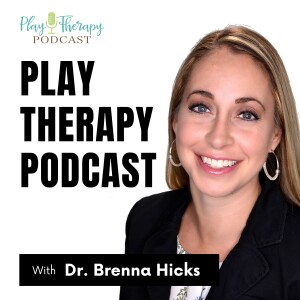
Silence in the Playroom: Navigating Child-Centered Play Therapy with a Selectively Mute Child
 2024-04-11
2024-04-11
Download
Right click and do "save link as"
In this episode, I tackle a nuanced situation shared by Nell from Maryland, a play therapist working with an 11-year-old client who does not speak during therapy sessions. Despite not being diagnosed as selectively mute, the child exhibits behaviors akin to selective mutism, engaging in play but not verbal communication.
While the child's parents are fixated on verbalization as the primary goal, I offer a crucial reframing. I also discuss the child's interaction with toys, particularly stuffed animals, to communicate and express themselves, highlighting the significant progress this represents.
My advice to Nell and all child-centered play therapists is twofold: first, we must clearly set expectations with parents from the start, helping them understand the stages, timelines, and principles of this therapeutic approach. Second, we must remain unwavering in our commitment to those principles, respectfully yet firmly guiding parents to trust the process and our clinical expertise. Forcing verbalization would undermine the child-led nature that allows for organic healing.
This discussion reminds us of the transformative power of patience, understanding, and adherence to the child-centered play therapy model.
If you would like to ask me questions directly, check out www.ccptcollective.com, where I host two weekly Zoom calls filled with advanced CCPT case studies and session reviews, as well as member Q&A. You can take advantage of the two-week free trial to see if the CCPT Collective is right for you.
Ask Me Questions: Call (813) 812-5525, or email: brenna@thekidcounselor.com
Brenna's CCPT Hub: https://www.playtherapynow.com
CCPT Collective (online community exclusively for CCPTs): https://ccptcollective.com
Podcast HQ: https://www.playtherapypodcast.com
APT Approved Play Therapy CE courses: https://childcenteredtraining.com
Twitter: @thekidcounselor https://twitter.com/thekidcounselor
Facebook: https://facebook.com/playtherapypodcast
References:
Cochran, N., Nordling, W., & Cochran, J. (2010). Child-Centered Play Therapy (1st ed.). Wiley.
VanFleet, R., Sywulak, A. E., & Sniscak, C. C. (2010). Child-centered play therapy. Guilford Press.
Landreth, G. L. (2002). Play therapy: The art of the relationship (2nd ed.). Brunner-Routledge.
Bratton, S. C., Landreth, G. L., Kellam, T., & Blackard, S. R. (2006). Child parent relationship therapy (CPRT) treatment manual: A 10-session filial therapy model for training parents. Routledge/Taylor & Francis Group.
Benedict, Helen. Themes in Play Therapy. Used with permission to Heartland Play Therapy Institute.
More Episodes
Sexual Curiosity Theme in Play Therapy
 2024-01-18
2024-01-18
 2024-01-18
2024-01-18
Sexual Talk Theme in Play Therapy
 2024-01-16
2024-01-16
 2024-01-16
2024-01-16
012345678910111213141516171819
Create your
podcast in
minutes
- Full-featured podcast site
- Unlimited storage and bandwidth
- Comprehensive podcast stats
- Distribute to Apple Podcasts, Spotify, and more
- Make money with your podcast
It is Free
- Privacy Policy
- Cookie Policy
- Terms of Use
- Consent Preferences
- Copyright © 2015-2024 Podbean.com





